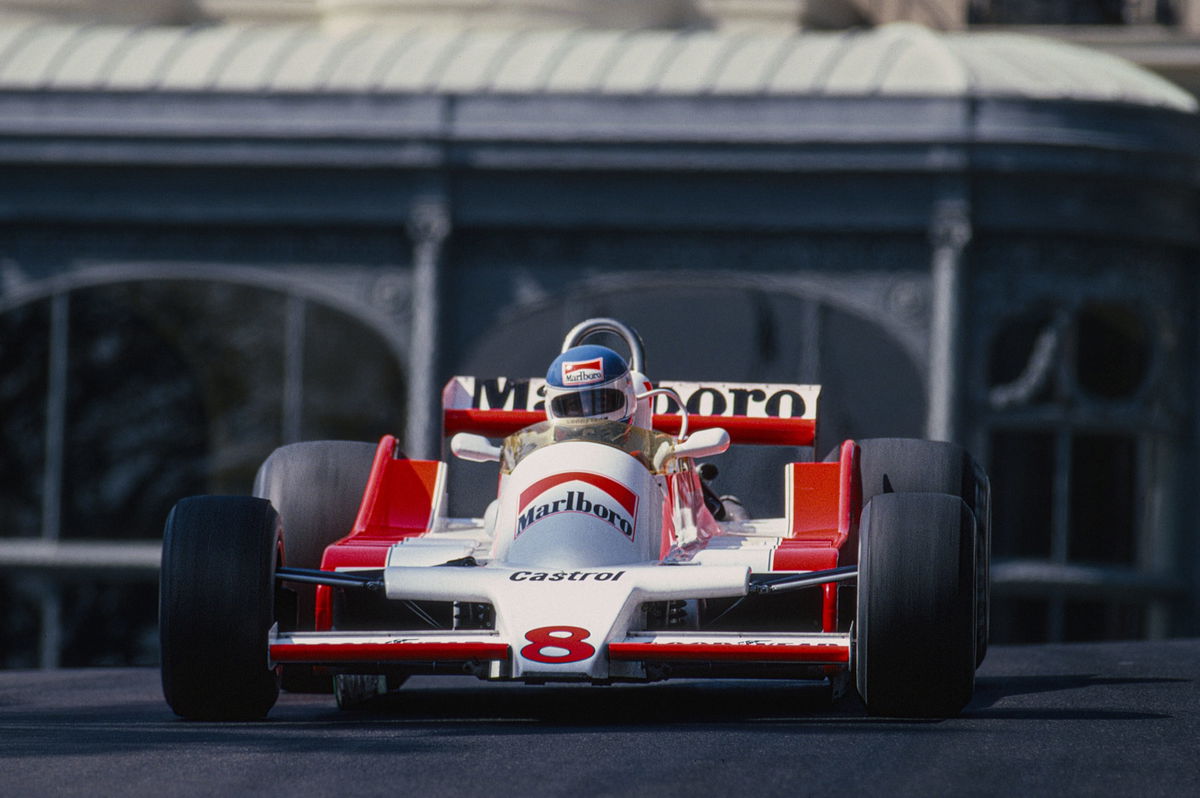
Imago
Patrick Tambay fra, McLaren M28-Ford, action during the 1979 F1 World Championship, WM, Weltmeisterschaft Monaco Grand Prix in Monte-Carlo, on may 27th – Formule 1, Formula 1, Motorsport, Car DPPI/Panoramic PUBLICATIONxNOTxINxFRAxITAxBEL 1979_GP_Monaco_Tambay

Imago
Patrick Tambay fra, McLaren M28-Ford, action during the 1979 F1 World Championship, WM, Weltmeisterschaft Monaco Grand Prix in Monte-Carlo, on may 27th – Formule 1, Formula 1, Motorsport, Car DPPI/Panoramic PUBLICATIONxNOTxINxFRAxITAxBEL 1979_GP_Monaco_Tambay
Ford has been a prestigious name in the automobile world. Despite their huge brand, the manufacturer had been hesitant to get into F1. It was in the 60s when the American company finally decided to enter F1. Since then, it has been a roller coaster of a journey for the Michigan-based brand. At one end, it was their DFV engine in partnership with Cosworth engineering that powered 10 constructors and 12 drivers’ championships. Meanwhile, Ford also experienced a rock bottom period with its Jaguar works team that led to the Red Bull dynasty.
Watch What’s Trending Now!
According to ESPN, the DFV engine was a masterful piece of engineering. The partnership with Cosworth was perhaps Ford’s reluctance to have any negative publicity if their engine failed. But, fortunately for the Blue Oval’s reputation, it worked tremendously well.
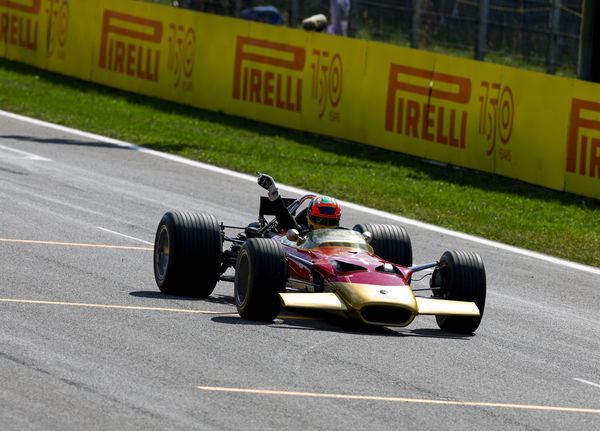
Imago
1969 Lotus-Ford Cosworth 49B, action with turbine engine, action during the Formula 1 Pirelli Gran Premio dItalia 2022, Italian Grand Prix 2022, 16th round of the 2022 FIA Formula One World Championship, WM, Weltmeisterschaft from September 9 to 11, 2022 on the Autodromo Nazionale di Monza, in Monza, Italy – F1 – ITALIAN GRAND PRIX 2022 DPPI/Panoramic PUBLICATIONxNOTxINxFRAxITAxBEL F12022GP16ITA_JK118542
Debuting at the 1967 Dutch GP, the Ford-Cosworth DFV showed its prowess in the hands of the legendary Jim Clark. While Clark won the race in his Lotus 49, the DFV engine was making noises in the F1 paddock. Eventually, Ford started powering several teams like McLaren, Matra, Brabham, Tyrrell, etc.
ADVERTISEMENT
As per Ford Performance, only Ferrari and BRM did not run Ford engines among all teams by 1973. It was an absolute masterpiece of engineering that saw Ford power the 10 constructors’ titles and 12 drivers’ titles until 1983 as per The Race. Even the famed 1976 season saw James Hunt winning with Ford’s engine in the back of his McLaren.
Even after the DFV retired in ’83, Ford continued to use turbo and naturally aspirated engines. 1994 was the last time, Ford’s engine won an F1 championship. It was Michael Schumacher winning with Benetton and winning Ford’s 13th driver’s championship title and his maiden one.
ADVERTISEMENT
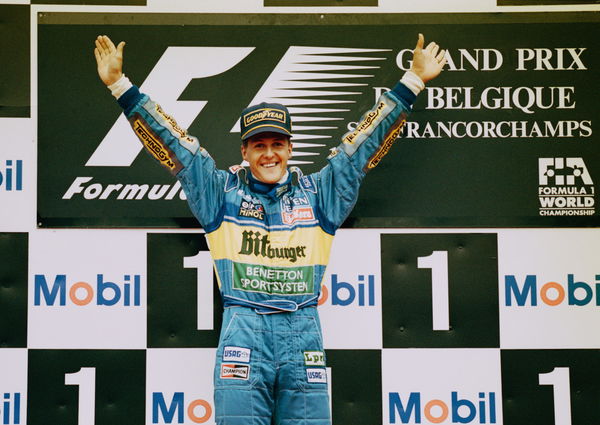
Getty
Michael Schumacher of Germany, driver of the #1 Mild Seven Benetton Renault Benetton B195 Renault RS7 V10 celebrates winning the Belgian Grand Prix on 27th August 1995 at the Circuit de Spa-Francorchamps in Spa Francorchamps, Belgium. (Photo by Ben Radford/Getty Images)
From this point, Ford’s decline began in F1. The American manufacturer continued to power different teams in the late 90s. But, when they bought the Stewart GP racing team and rebranded it as their works team, Jaguar F1, their real problems started.
ADVERTISEMENT
The Jaguar team never looked settled and in the 5 years from 2000 to 2004, they never finished higher than 7th in the constructors. The only bright spot during this time was a solitary race win for the Ford-powered Jordan. Giancarlo Fisichella made that victory possible at the 2003 Brazilian GP.
Top Stories
Helmut Marko Delivers 8-Word Warning to Max Verstappen as He Delivers Bad News Ahead of Miami GP
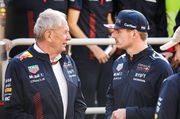
3 Years After His Death, Niki Lauda’s Wife Brutally Disrespects Him to Initiate $32,000,000 Battle Against Own Children

“Might as Well Sponsor Him”: $285M Worth Lewis Hamilton’s $200 Splurge on Fashion Essential Leaves Fans Swooning

Who Is Canadian F1 Billionaire Lawrence Stroll’s Daughter & Heiress Chloe Stroll?

Will Oscar Piastri’s GF Lily Zneimer End Up in F1 Just Like Beau? Here’s What We Know About Her Career Interests

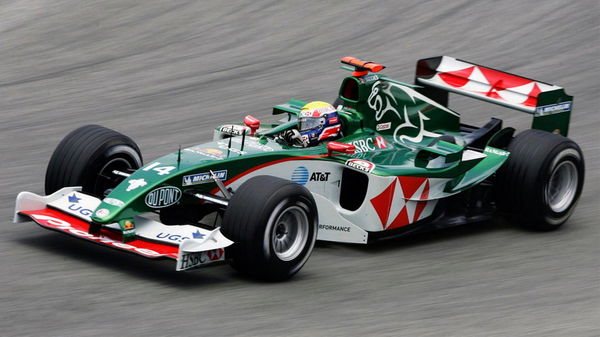
ADVERTISEMENT
Meanwhile, Ford decided to sell off Jaguar to Red Bull in 2005. Now, Red Bull took its time to get this racing team sorted. But within 4 years of this acquisition of Jaguar, Red Bull racing was challenging at the top of the F1 field. And the rest is history. Ford may have never thought in their wildest dreams that an Austrian drinks brand would create a dynasty in F1 on their undulating history in the pinnacle of motorsport.
ADVERTISEMENT
Ironically, Ford’s F1 return is with the same team that bought their Jaguar works team almost 2 decades ago. It seems like a full-circle moment and perhaps reflects Ford’s journey in F1. For their benefit, RBR is giving up its solo project to make way for their input. So, the American manufacturer would hope that this perhaps gives them the opportunity to recreate its glory days in F1 with the champions Red Bull.
The Adage and Culture that Reunited Ford with Red Bull in F1
When Red Bull announced Ford’s return to F1 as their strategic partner, many were puzzled about how it made sense. Red Bull’s boss Christian Horner explained how the two brands have great cultural and philosophical similarities.
ADVERTISEMENT
According to Motorsport.com, there are several aspects that Ford is offering Red Bull better than others. Apparently, the American manufacturer aligns a lot of its objectives with that of Red Bull related to F1. Both brands want to penetrate the US market on priority.
View this post on Instagram
The marketing philosophy also aligns well between the two brands. The adage ‘Win on Sunday, Sell on Monday’ is probably a big philosophical common ground. There is the commercial outlook that Red Bull and Ford’s sales and marketing teams will focus on, after every moment of success in F1.
ADVERTISEMENT
Besides, on the technical side as well, the two companies complement each other’s requirements. For the 2026 power unit, Ford will be contributing and helping Red Bull Powertrains with its electric car and battery technology knowledge.
According to Horner, the electric side of the PU would have been a weakness for RBPT. But with Ford’s insights, they can focus on producing the best hybrid power unit including the combustion engine. Even the 2026 engine rules are favoring more electric power and sustainable fuels. Thus it sits well with Ford’s push for more electric vehicle technology and sustainability.
ADVERTISEMENT
Everyone knows how close the Milton Keynes team had been working with Honda since 2019. Many thought Honda’s 2026 registration as an engine supplier pointed towards a Red Bull reunion. Meanwhile, the Porsche talks also looked promising before they collapsed. But, given the different levels on which Ford and Red Bull concur, the Detroit-based manufacturer clearly won this engine partner’s roulette.
WATCH THIS STORY: Road cars inspired from F1 technology
Ford’s history as an engine manufacturer and a brand in F1 may be undulating. But it is still glorious with 170+ race wins, and 23 championships combined with drivers and constructors. They would want to add to this illustrious CV come 2026. What do you think of Ford’s success chances with Red Bull in the new era of F1 engines?
ADVERTISEMENT
ADVERTISEMENT
ADVERTISEMENT